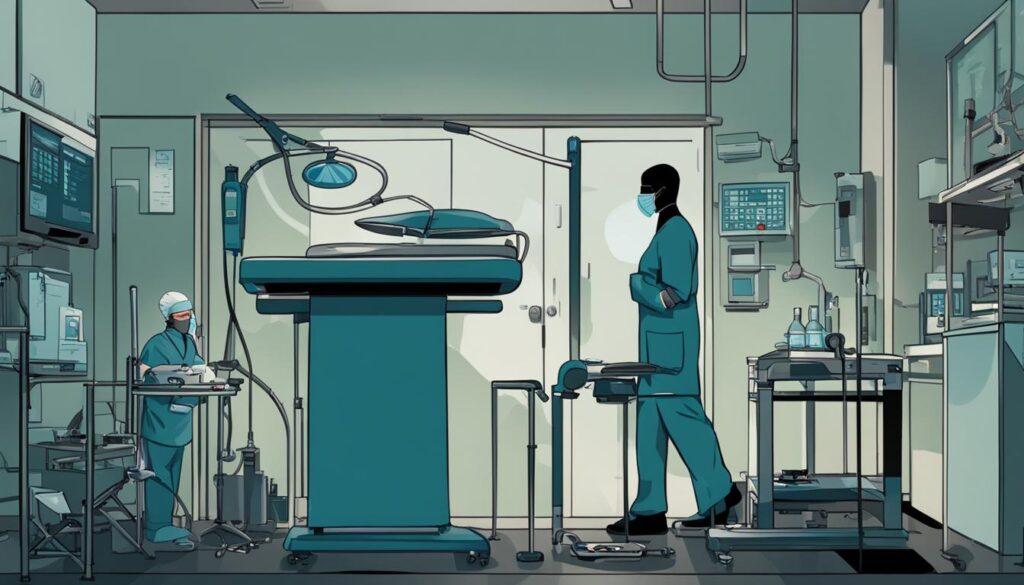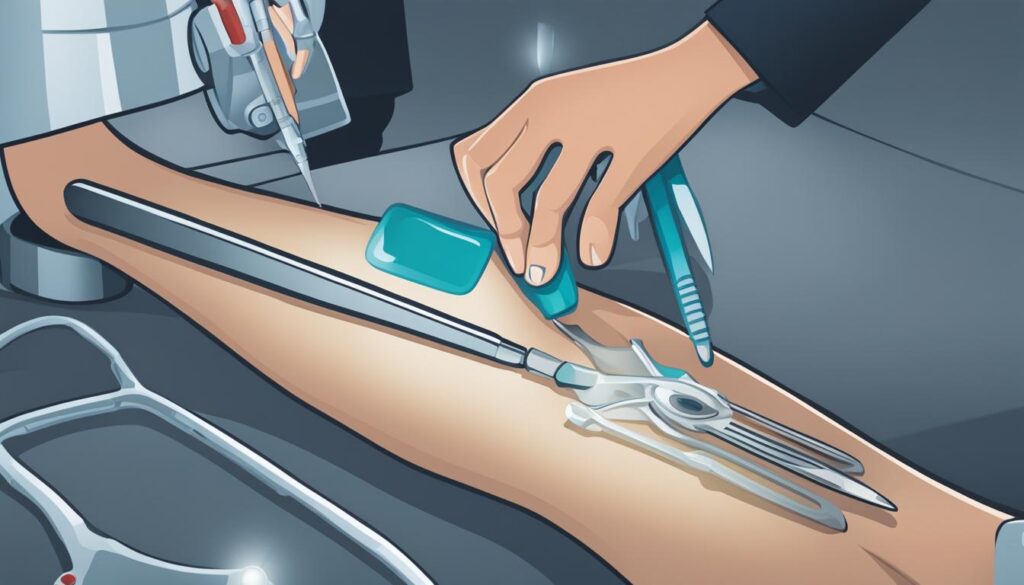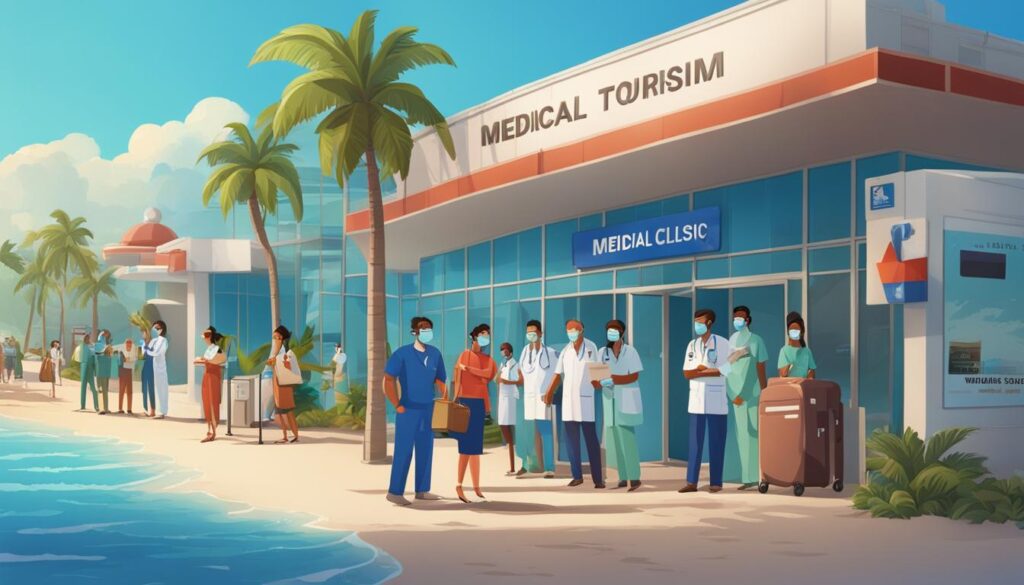When it comes to weight loss surgery and short-term disability, many people wonder if they can receive financial assistance during their recovery period. Short-term disability insurance can provide much-needed support after surgery, but whether weight loss surgery is covered depends on various factors, including the nature of the surgery and the terms of the insurance policy. Understanding the eligibility criteria and coverage limitations is crucial before making a claim.
Key Takeaways
- Short-term disability insurance may provide financial assistance after surgery, but coverage for weight loss surgery varies depending on the policy and its terms.
- Each insurance policy has its own eligibility criteria and coverage limitations. It's important to review the policy details before making a claim.
- Weight loss surgeries may be covered if they are medically necessary to alleviate physical symptoms, as prescribed by a doctor.
- Short-term disability insurance typically covers medically necessary procedures but excludes cosmetic surgeries deemed unnecessary for medical reasons.
- Other types of surgeries, such as dental and orthopedic surgeries, may also have specific coverage considerations under short-term disability insurance.
How Short-Term Disability Insurance Works After Surgery
Short-term disability insurance provides coverage for a portion of your salary when you are unable to work due to a disability, including recovery from surgery. The specific benefits and terms of coverage vary depending on the policy you have. Understanding how this type of insurance works can help you navigate the claims process and ensure financial stability during your recovery.
Here's a breakdown of how short-term disability insurance works:
- Benefit Percentage: Short-term disability insurance typically pays a percentage of your salary, such as 60% or 70%, while you are unable to work.
- Elimination Period: The elimination period is the waiting period before you can start receiving benefits. It is usually a specific number of days, such as 7 or 14, and begins after you become disabled.
- Benefit Period: The benefit period is the maximum length of time that benefits will be paid out. It varies depending on your policy and can range from a few weeks to several months.
- Filing a Claim: To receive short-term disability benefits after surgery, you will need to file a claim with your insurance company. This typically involves completing a claim form and providing supporting documentation, such as medical records and a healthcare provider's statement.
- Approval Process: Once you submit your claim, the insurance company will review the documentation and assess your eligibility for benefits. The approval process may involve additional requests for information or a review by the insurance company's medical team.
- Benefit Payments: If your claim is approved, the insurance company will start providing benefit payments according to the terms of your policy. These payments are typically made on a weekly or bi-weekly basis.
Short-term disability insurance can provide valuable financial assistance during your recovery from surgery. It is important to review your policy carefully and understand the coverage limits, waiting period, and benefit duration to ensure you have the necessary support during this time.
The benefit period and elimination period vary depending on the policy.
Qualifying Procedures for Short-Term Disability

In order to qualify for short-term disability insurance, the procedures must be medically necessary as prescribed by a doctor for the treatment of an injury or illness. These procedures are determined based on accepted medical standards. However, it's important to note that each policy has its own set of exclusions and limitations that must be considered.
If you're considering filing a claim for short-term disability, it's crucial to review your policy and understand what procedures are covered. Some common exclusions and limitations that may be present in policies include:
- Pre-existing Conditions: Some policies may exclude coverage for conditions that existed prior to the start of the policy.
- Self-Inflicted Injuries: Injuries caused intentionally by the individual may not be covered by short-term disability insurance.
- Drug or Alcohol-Related Injuries: Injuries that occur while under the influence of drugs or alcohol may not be covered.
It's essential to thoroughly read the policy and consult with the insurance provider to understand the specific exclusions and limitations that apply. This will help ensure that you have a clear understanding of what procedures are eligible for coverage under your short-term disability insurance.
For a better understanding, refer to the table below:
| Exclusions and Limitations |
|---|
| Pre-existing Conditions |
| Self-Inflicted Injuries |
| Drug or Alcohol-Related Injuries |
Quote:
“It is crucial to thoroughly understand the exclusions and limitations of your short-term disability insurance policy to determine if your medically necessary procedures are covered.” – Insurance Expert
Short-Term Disability and Plastic Surgery
When it comes to short-term disability insurance, a distinction is made between reconstructive surgery and cosmetic surgery. Understanding this difference is crucial in determining coverage for these procedures.
Reconstructive surgery, which aims to restore physical function and improve quality of life, is generally covered by short-term disability insurance. This includes procedures such as breast reconstruction after mastectomy or surgery to alleviate chronic back pain.
Cosmetic surgery, on the other hand, is typically considered elective and unnecessary for medical reasons. As a result, it is not usually covered by short-term disability insurance policies.
However, there are exceptions to this general rule. In cases where the reconstructive surgery is related to underlying health conditions such as breast cancer or chronic back pain, short-term disability benefits may be provided.
| Procedure | Covered by Short-Term Disability Insurance? |
|---|---|
| Breast reconstruction after mastectomy | Yes |
| Rhinoplasty (cosmetic) | No |
| Spinal fusion for chronic back pain | Yes |
| Liposuction (cosmetic) | No |
Key Takeaways
- Short-term disability insurance distinguishes between reconstructive surgery and cosmetic surgery.
- Reconstructive surgeries that restore physical function may be covered.
- Cosmetic surgeries that are deemed unnecessary for medical reasons are generally not covered.
- Exceptions exist for reconstructive surgeries related to underlying health conditions.
Short-Term Disability and Weight Loss Surgery

When it comes to short-term disability insurance, weight loss surgeries like gastric bypass, bariatric, and lap band surgeries may be approved if they are medically necessary to alleviate physical symptoms. The coverage for these procedures depends on the specific circumstances and whether they are prescribed by a doctor.
Weight loss surgery, also known as bariatric surgery, is often recommended for individuals who have been unsuccessful in losing weight through traditional methods such as diet and exercise. It is considered medically necessary when they suffer from obesity-related health conditions or physical symptoms that significantly impact their quality of life. These symptoms may include but are not limited to:
- Severe joint pain and arthritis due to excess weight
- Diabetes and other chronic conditions aggravated by obesity
- Sleep apnea and breathing difficulties
- High blood pressure and cardiovascular issues
For individuals experiencing these physical symptoms, weight loss surgery can provide significant relief and improve overall health and well-being. Short-term disability insurance carriers understand the medical necessity of these procedures and may cover them accordingly if all requirements are met.
“Weight loss surgery can be life-changing for individuals struggling with severe obesity and its associated physical symptoms. Short-term disability insurance can provide financial support during the recovery period, allowing patients to focus on their health without the added stress of income loss.”
It is important to note that not all weight loss surgeries will be covered by short-term disability insurance. The specific policy terms and conditions will determine the coverage eligibility. Additionally, the procedure must be performed by a qualified healthcare professional who deems it medically necessary based on the individual's physical symptoms and overall health condition. A thorough evaluation and documentation from the healthcare provider are crucial when filing a claim for short-term disability benefits related to weight loss surgery.
Benefits of Short-Term Disability Insurance for Weight Loss Surgery
Short-term disability insurance provides several benefits for individuals undergoing weight loss surgery. These include:
- Financial assistance during the recovery period: Short-term disability benefits can provide partial income replacement while individuals are unable to work due to the surgery and recovery process.
- Medical expenses coverage: In addition to income replacement, short-term disability insurance may also cover a portion of the medical expenses associated with weight loss surgery, such as hospitalization and post-surgery consultations.
- Peace of mind: Knowing that financial support is available can alleviate the stress and anxiety often experienced during the recovery period after weight loss surgery.
| Policy Coverage | Eligibility Criteria | Claim Process |
|---|---|---|
| Percentage of salary | – Medically necessary weight loss surgery – Prescribed by a qualified healthcare professional |
– Submit claim form – Provide necessary medical documentation – Follow employer's guidelines for filing claims |
Short-Term Disability and Dental Surgery
When it comes to dental surgery, coverage under short-term disability insurance can vary depending on the policy. While some policies may exclude dental surgeries altogether, others may provide coverage if the procedure is necessary due to an accident or injury. It's essential to thoroughly review the policy terms to understand the extent of coverage for dental procedures.
Dental surgeries can encompass a range of procedures, including oral surgeries, root canals, extractions, and more. While some may be considered elective or cosmetic in nature, others may be essential for treating oral health conditions or injuries. Insurance companies typically differentiate between elective and medically necessary surgeries when determining coverage.
If dental surgery is deemed necessary due to an accident or injury, it may fall under the coverage provided by short-term disability insurance. Accidents or injuries that result in dental damage can occur in various situations, such as car accidents, sports-related incidents, or workplace injuries. In these cases, short-term disability insurance can help provide financial support during the recovery period.
It's crucial to consult the specific policy and its definitions to determine the extent of coverage for dental procedures. Some policies may have specific limitations or exclusions regarding dental surgeries, particularly if they are not related to accidents or injuries. Understanding these terms will help you navigate the claims process and ensure you receive the appropriate coverage.
Example presented table:
| Dental Procedure | Coverage |
|——————–|——————————————————|
| Oral Surgery | Covered if necessary due to accidents or injuries |
| Root Canal | Coverage may vary based on policy terms |
| Extractions | Covered if necessary due to accidents or injuries |
| Cosmetic Procedures| Generally not covered unless required for accidents or injuries |
As displayed in the table above, coverage for dental procedures can differ depending on their nature and the circumstances leading to their necessity. Some procedures, such as oral surgeries or extractions, may be covered if they are required due to accidents or injuries. However, cosmetic procedures are generally not covered unless they are deemed necessary for accident or injury-related reasons.
When considering short-term disability insurance for dental surgeries, it's crucial to consult with your insurance provider to fully understand the terms and conditions of coverage. They can provide valuable insights into what is considered eligible and guide you through the claims process.
Short-Term Disability and Orthopedic Surgery

Surgeries to alleviate pain or treat conditions in the hips, knees, feet, ankles, shoulders, elbows, hands, and spine are often considered medically necessary and qualify for short-term disability benefits. Orthopedic surgery plays a crucial role in restoring mobility and reducing pain in individuals with musculoskeletal conditions.
Orthopedic surgeons specialize in the diagnosis, treatment, and rehabilitation of injuries and diseases affecting the musculoskeletal system. They perform various procedures, including joint replacements, ligament repairs, fracture fixations, and spinal surgeries. These surgeries aim to improve function, reduce pain, and enhance the overall quality of life for patients.
When it comes to short-term disability insurance, orthopedic surgeries that are considered medically necessary are typically eligible for benefits. However, it's important to note that surgeries to treat injuries sustained at work fall under workers' compensation, not short-term disability insurance. Therefore, if you've sustained an orthopedic injury at work, you should file a workers' compensation claim rather than a short-term disability claim.
If you're unsure whether your orthopedic surgery qualifies for short-term disability benefits, it's best to consult with your healthcare provider and review your insurance policy. They can provide guidance on eligibility and help you navigate the claims process.
Remember, every insurance policy is different, and coverage may vary. It's essential to familiarize yourself with your specific policy's terms and conditions to ensure you understand what is covered and what isn't.
Quotes:
“Orthopedic surgery is a highly specialized field that focuses on diagnosing and treating musculoskeletal conditions. These surgeries can greatly improve patients' quality of life by reducing pain and restoring function.” – Dr. Emily Johnson, Orthopedic Surgeon
“Short-term disability insurance provides financial support during the recovery period after orthopedic surgery. It can help alleviate the financial burden of being unable to work while recovering.” – Sarah Thompson, Insurance Consultant
Common Orthopedic Surgeries
| Surgery Type | Medical Necessity |
|---|---|
| Joint Replacement (e.g., Hip, Knee) | Medically necessary for severe joint damage or arthritis |
| Ligament Repair | Medically necessary for ligament instability and function loss |
| Fracture Fixation | Medically necessary for bone fractures that require stabilization |
| Spinal Surgery | Medically necessary for spinal conditions causing severe pain or loss of function |
Short-Term Disability and Medical Tourism

When considering medical treatment outside the United States, it's essential to understand the limitations and exclusions of your short-term disability insurance. Medical tourism, which involves seeking medical procedures or surgeries in foreign countries, may impact your eligibility for benefits.
Short-term disability policies typically provide coverage for medical treatments received within the United States. If you choose to undergo medical tourism, there is a possibility that your insurance will not provide benefits for procedures performed outside the country.
To ensure you fully understand the limitations and exclusions of your policy, it is important to review the terms and conditions carefully. Familiarize yourself with the specific guidelines regarding medical tourism and the impact it may have on your short-term disability coverage.
When it comes to your health and well-being, it's crucial to make informed decisions. Before embarking on medical tourism, consult with your insurance provider and consider seeking legal or professional advice to avoid any potential risks or unexpected financial burdens.
“It's essential to review the terms and conditions of your short-term disability insurance policy to understand the limitations and exclusions regarding medical tourism.”
Making a Short-Term Disability Insurance Claim After Surgery

After undergoing surgery, filing a claim for short-term disability insurance can provide the financial support you need during your recovery. To initiate the process, there are a few important steps to follow.
Gather the Necessary Documentation
The first step is to obtain a claim form from your insurance provider. This form will require you to provide details about your surgery, such as the date and type of procedure. Additionally, you will need a statement from your healthcare provider that confirms your inability to work due to the post-surgery disability.
Note: It is essential to carefully review your insurance policy for any specific requirements or additional documentation needed.
Complete the Claim Form
Fill out the claim form with accurate and detailed information. Be sure to include your personal information, contact details, and relevant medical information. Make sure to double-check all the provided information to avoid any errors or delays in processing your claim.
Submit the Claim
Once the claim form is completed and the required documentation is gathered, you can submit your claim to your employer or directly to the insurance provider. It is essential to follow the designated submission process specified by your employer, as they may have specific guidelines in place. You may also need to provide any additional information requested by your insurance provider.
Wait for Evaluation
After submitting your claim, the insurance provider will evaluate the submitted information and documentation to determine your eligibility for short-term disability benefits. This evaluation process may take some time, so it is crucial to be patient during this period.
Communicate with Your Employer
Throughout the claim process, maintain open communication with your employer. They may require updates on your recovery progress or additional documentation to support your claim. By staying in touch, you can ensure a smooth process and address any concerns promptly.
Keep a Record
It is essential to keep a record of all communications, submitted documents, and any other relevant information related to your claim. This record will serve as a reference and evidence of your claim in case of any disputes or inquiries in the future.
Remember, each state may have its own guidelines for short-term disability insurance, so be sure to familiarize yourself with any specific requirements or processes that apply to your location.
| Step | Description |
|---|---|
| 1 | Gather the necessary documentation, including a claim form and statement from your healthcare provider. |
| 2 | Complete the claim form accurately, providing all requested information. |
| 3 | Submit the claim form and supporting documentation to your employer or insurance provider following the specified process. |
| 4 | Wait for the evaluation of your claim by the insurance provider. |
| 5 | Maintain open communication with your employer and provide any updates or additional documentation requested. |
| 6 | Keep a record of all communication, documents, and relevant information related to your claim. |
Should You Buy Short-Term Disability Insurance for Surgery?

Purchasing short-term disability insurance for surgery is a personal decision that requires careful consideration. While it can provide financial protection during your recovery period, there are factors to weigh before making a choice. Here are some key points to consider:
1. Individual Assessment
Every individual's situation and needs are unique. It is important to assess your own financial circumstances and evaluate whether purchasing short-term disability insurance for surgery aligns with your specific requirements. Consider factors such as your anticipated time away from work, potential risks, and available financial resources.
2. Premium Costs
One aspect to consider when deciding on short-term disability insurance is the cost of premiums. Premiums for this type of insurance can vary depending on factors such as age, health condition, occupation, and desired coverage amount. It is essential to carefully review the premium costs associated with the coverage you need and ensure it fits within your budget.
3. Coverage Limitations
Before purchasing short-term disability insurance, it is crucial to understand the coverage limitations and exclusions that may apply. Some policies may have waiting periods, specific criteria for eligibility, or restrictions on pre-existing conditions. Be sure to thoroughly review the policy terms and conditions to have a clear understanding of what will be covered.
4. Alternative Options
Consider alternative options for managing your finances during a recovery period. Dedicating funds to build an emergency savings account or self-insuring for medical expenses may be more suitable for your specific situation. The decision to purchase short-term disability insurance should be balanced with other available financial strategies.
I advise clients to carefully evaluate all available options and consult with a financial advisor before making a decision on purchasing short-term disability insurance for surgery. It's important to consider your individual needs, assess the pros and cons, and make an informed choice that aligns with your financial goals and circumstances.
Ultimately, the decision to purchase short-term disability insurance for surgery depends on your individual circumstances, risk tolerance, and financial situation. Take the time to thoroughly research your options and consult with a trusted financial advisor to make the best choice for your needs.
| Factors to Consider | Short-Term Disability Insurance | Alternative Options |
|---|---|---|
| Premium Costs | Variable, based on factors such as age, health, occupation | Dependent on personal savings and self-insurance |
| Coverage Limitations | May have waiting periods, eligibility criteria, and restrictions on pre-existing conditions | Dependent on personal savings flexibility |
| Risk Management | Provides financial protection during recovery period | Relies on personal savings and self-insurance |
| Financial Advisor Recommendation | Varies based on individual situation | Varies based on individual situation |
Conclusion
In conclusion, short-term disability insurance can be a valuable resource for individuals who are undergoing surgery and require financial assistance during their recovery period. However, it is crucial to carefully review the policy details and understand the eligibility criteria and coverage limitations before making a decision.
When considering purchasing short-term disability insurance for surgery, it is important to weigh the benefits against the potential costs. Premiums for this type of insurance can be high compared to the potential payout, so it may be beneficial to explore other options such as self-insuring or building an emergency fund.
If you already have short-term disability insurance, it is essential to understand the procedures for filing a claim and the required documentation, such as a claim form and a statement from your healthcare provider. Additionally, be aware of any limitations or exclusions in your policy regarding pre-existing conditions or medical treatments received outside of the United States.
By carefully considering your specific needs and circumstances, as well as evaluating the terms and coverage of short-term disability insurance, you can make an informed decision that provides the financial assistance you need during your recovery from surgery.
FAQ
Can you get short-term disability for weight loss surgery?
Whether weight loss surgery is covered by short-term disability insurance depends on the nature of the surgery and the terms of the insurance policy. It is important to understand the eligibility criteria and coverage limitations before making a claim.
How does short-term disability insurance work after surgery?
Short-term disability insurance pays a percentage of your salary while you are unable to work due to a disability, including recovery from surgery. The benefit period and elimination period vary depending on the policy. It is necessary to file a claim with the insurer to receive benefits.
What qualifying procedures are covered by short-term disability?
Qualifying procedures for short-term disability insurance are typically those that are prescribed by a doctor as required treatment for an injury or illness and considered medically necessary according to accepted medical standards. Each policy has its own list of exclusions and limitations, which may include pre-existing conditions, self-inflicted injuries, and injuries caused by drug or alcohol use.
Does short-term disability insurance cover plastic surgery?
Short-term disability insurance companies distinguish between reconstructive surgery and cosmetic surgery. Reconstructive surgeries that restore physical function may be covered, while cosmetic surgeries that are deemed unnecessary for medical reasons are generally not covered. However, there are exceptions for reconstructive surgeries related to health conditions such as breast cancer or chronic back pain.
Does short-term disability insurance cover weight loss surgery?
Many short-term disability insurance carriers approve claims for weight loss surgeries such as gastric bypass, bariatric, or lap band surgeries if they are considered medically necessary to alleviate physical symptoms. The coverage depends on the specific circumstances and whether the procedure is prescribed by a doctor.
Does short-term disability insurance cover dental surgery?
The coverage for dental surgeries under short-term disability insurance varies depending on the policy. Some policies exclude dental surgeries, while others may cover them if they are required due to an accident or injury. It is important to review the policy terms to understand the coverage for dental procedures.
Does short-term disability insurance cover orthopedic surgery?
Surgeries to alleviate pain or treat conditions in the hips, knees, feet, ankles, shoulders, elbows, hands, and spine are often considered medically necessary and qualify for short-term disability benefits. However, surgeries to treat injuries sustained at work are covered under workers' compensation, not short-term disability insurance.
Does short-term disability insurance cover surgeries outside the United States?
Short-term disability policies may not provide benefits if medical treatment is received outside of the United States. It is important to check the policy for limitations and exclusions regarding medical tourism to foreign countries for procedures or surgeries.
How do I make a short-term disability insurance claim after surgery?
To make a short-term disability insurance claim after surgery, you need to submit a claim form and a statement from your healthcare provider stating that you are unable to work due to a disability. Employers may have specific guidelines for filing claims, and state disability insurance programs may have their own guidelines as well.
Should I buy short-term disability insurance for surgery?
Purchasing short-term disability insurance for surgery is an individual decision. Financial advisors may recommend self-insuring or building an emergency fund instead, as premiums for short-term disability insurance can be high compared to the potential payout. Additionally, privately purchased policies may have limitations and exclusions for pre-existing conditions.
Source Links
- https://www.policygenius.com/disability-insurance/disability-insurance-and-elective-surgery/
- https://www.longtermdisabilitylawyer.com/2017/06/can-look-short-term-disability-post-surgery-ii/
- https://www.disabilitysecrets.com/resources/disability/short-term-disability-laws/benefits-medical-operations.htm




